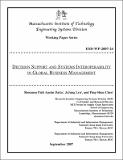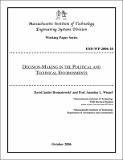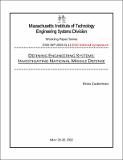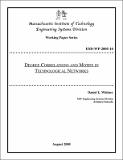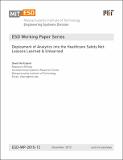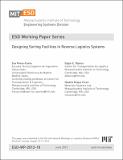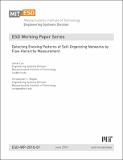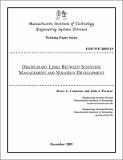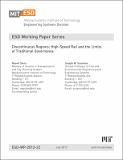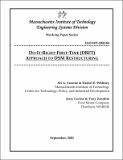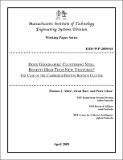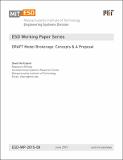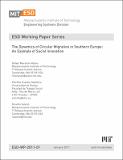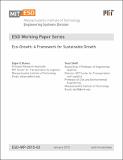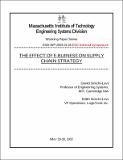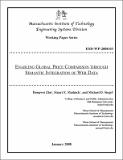Browsing Engineering Systems Division by Title
Now showing items 62-81 of 273
-
Decision Support and Systems Interoperability in Global Business Management
(Massachusetts Institute of Technology. Engineering Systems Division, 2007-09)Globalization of business and volatility of financial markets has catapulted ‘cycle-time’ as a key indicator of operational efficiency in business processes. Systems automation holds the promise to augment the ability of ... -
Decision-Making in the Political and Technical Environments
(Massachusetts Institute of Technology. Engineering Systems Division, 2006-10)Mutual misunderstanding between decision-makers in the political and technical environment leads to programs that experience cost overruns, schedule delays and, often, cancellation. This paper compares and contrasts the ... -
Defining Engineering Systems: Investigating National Missile Defense
(Massachusetts Institute of Technology. Engineering Systems Division, 2002-05)The MIT Engineering Systems Division is currently building its intellectual framework. There is not yet consensus within ESD as to which tools and methods are central to the nascent engineering systems approach; which ... -
Degree Correlations and Motifs in Technological Networks
(Massachusetts Institute of Technology. Engineering Systems Division, 2005-08)Recent network research has sought to characterize complex systems with a number of statistical metrics, such as power law exponent (if any), clustering coefficient, community behavior, and degree correlation. A larger ... -
Deployment of Analytics into the Healthcare Safety Net: Lessons Learned & Unlearned
(Massachusetts Institute of Technology. Engineering Systems Division, 2015-12)In October of 2013, I made a proposal to the RCHN Community Health Foundation to start a project that would deploy a contemporary analytic software capability into community health centers that volunteered for the project ... -
Design and Management of Flexible Transportation Networks Through the use of Intelligent Transportation Systems (ITS)
(Massachusetts Institute of Technology. Engineering Systems Division, 2008-02)Designing a flexible system with real options is a method for managing uncertainty. In this research, Intelligent Transportation System (ITS) capabilities were used to create a flexible transportation system, capable of ... -
Design of Ground Delay Programs Considering the Stakeholder Perspective
(Massachusetts Institute of Technology. Engineering Systems Division, 2008-10)A Ground Delay Program (GDP) is an initiative used by the FAA to manage the rate at which aircraft demand arrival at capacity-constrained airports. In this paper, we adapt a framework developed by Mitchell et al. (1997) ... -
Designing a Requirement Driven Product Development Process
(Massachusetts Institute of Technology. Engineering Systems Division, 2001-09)This paper presents a technique to obtain a Design Structure Matrix (DSM) from a Design Matrix (DM). This technique enables us to obtain the design information flow pattern at early stage of the design, and apply the DSM ... -
Designing Sorting Facilities in Reverse Logistics Systems
(Massachusetts Institute of Technology. Engineering Systems Division, 2012-06)The main aim of this paper is to propose a multi-waste mix integer lineal programming model for locating sorting facilities in a three-level (local, regional, and central) reverse logistic network. The objective of the ... -
Detecting Evolving Patterns of Self-Organizing Networks by Flow Hierarchy Measurement
(Massachusetts Institute of Technology. Engineering Systems Division, 2010-06)Hierarchies occur widely in evolving self-organizing ecological, biological, technological and social networks, but detecting and comparing hierarchies is difficult. Here we present a metric and technique to quantitatively ... -
Disciplinary Links Between Scientific Management and Strategy Development
(Massachusetts Institute of Technology. Engineering Systems Division, 2009-12)We investigate the incidence of links between the historical discipline of scientific management and the modern study of strategy development. Despite a century’s separation, these two disciplines share noticeable commonality ... -
Discontinuous Regions: High-Speed Rail and the Limits of Traditional Governance
(Massachusetts Institute of Technology. Engineering Systems Division, 2012-07)Globalization and the interconnectivity of the economy have magnified the role of regions, restructuring social and economic relationships into networks that span increasing distances. At the same time, greater attention ... -
Do-It-Right-Fisrt-Time (DRFT) Approach to DSF Restructuring
(Massachusetts Institute of Technology. Engineering Systems Division, 2001-09)In this paper, we argue, using two real-world applications from the automotive industry, that the biggest benefit of a Design Structure Matrix (DSM) model may come not from resequencing and partitioning, but rather from ... -
Does Geographic Clustering Still Benefit High Tech New Ventures? The Case of the Cambridge/Boston Biotech Cluster
(Massachusetts Institute of Technology. Engineering Systems Division, 2009-04)An empirical study of scientific communication among biotechnology companies supports the belief that geographic clustering does produce increased scientific exchange among companies. A comparison of companies within a ... -
DRAFT Model Brokerage: Concepts & A Proposal
(Massachusetts Institute of Technology. Engineering Systems Division, 2015-06)Effective & efficient utilization of models is essential for facilitating high productivity in many different types of organizations. If models could be shared across technical, temporal & organizational boundaries, much ... -
The Dynamics of Circular Migration in Southern Europe: An Example of Social Innovation
(Massachusetts Institute of Technology. Engineering Systems Division, 2011-01)During economic crises, governments establish policies that facilitate the creation of jobs, goods and services that make their economies more resilient. Often, this requires innovative social programs that match global ... -
The Earth as an Engineering System: Addressing Sustainability through Science, Technology and Policy
(Massachusetts Institute of Technology. Engineering Systems Division, 2012-03)We combine insights from the two emerging fields of engineering systems and sustainability science to develop an analytical approach for understanding and managing coupled natural and human systems. The Earth system is ... -
Eco-Growth: A Framework for Sustainable Growth
(Massachusetts Institute of Technology. Engineering Systems Division, 2015-01)Growth is imperative for corporate success and yet the environmental impact of this growth is not sustainable. In this paper we offer a framework for thinking about the stages of tackling the environmental sustainability ... -
The Effect of e-Business on Supply Chain Strategy
(Massachusetts Institute of Technology. Engineering Systems Division, 2002-05)Internet technology has forced companies to redefine their business models so as to improve the extended enterprise performance - this is popularly called e-business. The focus has been on improving the extended enterprise ... -
Enabling Global Price Comparison with Semantic Integration of Web Data
(Massachusetts Institute of Technology. Engineering Systems Division, 2008-01)“Sell Globally” and “Shop Globally” have been seen as a potential benefit of web-enabled electronic business. One important step toward realizing this benefit is to know how things are selling in various parts of the world. ...
